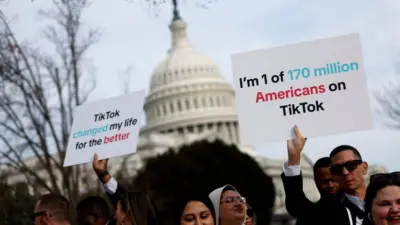We've updated our Privacy and Cookies Policy
We've made some important changes to our Privacy and Cookies Policy and we want you to know what this means for you and your data.
Covid-19: Boris Johnson to unveil 'cautious' plan to lift England's lockdown
All schools in England are to reopen on 8 March as part of the prime minister's "cautious" four-part plan to lift the coronavirus lockdown.
Boris Johnson will share his finalised roadmap with ministers later, before unveiling it to MPs and then leading a news conference at 19:00 GMT.
Up to six people or two households will be allowed to meet outdoors from 29 March, the vaccines minister said.
Rules will be lifted in stages and four conditions must be met at each stage.
Vaccines Minister Nadhim Zahawi told BBC Breakfast the prime minister would set out more details on the plan in a Commons statement, which is expected at around 15:30.
The first stage of easing will be split into two parts:
- From 8 March - All schools will open with outdoor after-school sports and activities allowed. Recreation in a public space - such as a park - will be allowed between two people, meaning they would be allowed to sit down for a coffee, drink or picnic
- From 29 March - Outdoor gatherings of either six people or two households will be allowed. It is understood this will include gatherings in private gardens. Outdoor sports facilities such as tennis or basketball courts will reopen and organised adult and children's sport, such as grassroots football, will also return
Although schools are set to reopen to all pupils on 8 March, it is thought a few days' flexibility may be built in to allow measures like testing to be put in place.
Also on 8 March, new rules will allow each care home resident in England to have one regular visitor, with whom they can hold hands.
And from 29 March it is also understood that people will once again be able to travel out of their areas - although guidance will likely still recommend staying local, and overnight stays will not be permitted.
The gap between each stage of restrictions being eased is expected to be five weeks, according to BBC political editor Laura Kuenssberg.
It comes as children aged three to seven in Wales return to the classroom, along with some students on practical college courses.
Scotland's youngest pupils are also returning to face-to-face teaching in the first step of the phased reopening of schools there.
Meanwhile, vaccination has had a significant impact on the risk of serious illness from Covid-19, analysis by Public Health Scotland shows.
Figures for England are expected later.
Data will be used to inform "every step" of lifting restrictions, Mr Johnson said.
"We will be cautious about this approach so that we do not undo the progress we have achieved so far and the sacrifices each and every one of you has made to keep yourself and others safe," he added.
The roadmap will outline four steps for easing restrictions. But before proceeding to each next step, the government will examine the data to assess the impact of previous changes.
The four conditions that must be met at each phase of lockdown easing are:
- The coronavirus vaccine programme continues to go to plan
- Evidence shows vaccines are sufficiently reducing the number of people dying with the virus or needing hospital treatment
- Infection rates do not risk a surge in hospital admissions
- New variants of the virus do not fundamentally change the risk of lifting restrictions
Downing Street said the four tests are currently being met so the first step of lockdown easing in England will proceed as planned on 8 March.
The first stage of easing restrictions will be across the whole of England, Downing Street added, due to the current uniform spread of the virus.
MPs will be given the chance to vote on the regulations enabling England's roadmap in the coming weeks.
Sir Charles Walker, the vice-chair of the 1922 Committee of backbench Conservative MPs, said the government needed "flexibility" if infections levels dropped more quickly than expected.
"You can't have a timeline and say you you're going to be data driven. You can either have one or the other," he told BBC Radio 4's World at One programme.
The rules of combat are beginning to change.
No longer is controlling infection and keeping R below 1 seen as the be-all and end-all.
That much is clear from the government's four tests for its roadmap to lift lockdown in England.
Infection rates are only being seen as a problem if they risk a surge in hospital admissions.
The reasons for that change can be found from the early results published on the UK vaccination programme.
Scottish researchers have found a "spectacular" reduction in the risk of serious illness four weeks after the first dose of the vaccine is given.
The link between infections and serious illness is being broken.
That is not to say a surge in infections can or will be tolerated - the number of Covid patients in hospital is still only just below where it was in the first peak and not all vulnerable people have been vaccinated yet.
But it does give ministers some room for manoeuvre. That is important. Schools are not seen as a significant driver of infection, but reopening them for all could push infection levels up.
Labour leader Sir Keir Starmer said he wanted the prime minister "to learn the lessons of the last two lockdowns" when "he came out too quickly".
He told LBC that with restrictions in place for longer, businesses "desperately" needed more support, including the extension of business rates relief and VAT cuts for the hospitality sector.
All four UK nations have been in lockdown for weeks, after hospitals were put under unprecedented pressure due to the rapid spread of a variant of the virus, first detected in Kent.
The devolved nations have the power to set their own restrictions.
First Minister Nicola Sturgeon said Scotland would return to a tiered system of restrictions when lockdown measures are eased, meaning different parts of the country could be under different rules. She added that she would set out the likely phases for a gradual lifting of restrictions on Tuesday.
In Wales, First Minister Mark Drakeford said he hopes the "stay-at-home" requirement could end within three weeks, with some non-essential shops and hairdressers possibly reopening at the same time.
Northern Ireland's health minister has played down the prospect of restrictions being eased in time for Easter. A review of current measures will take place on 18 March.
Pre-school, nursery and pupils in primaries one to three will return to classrooms in Northern Ireland on 8 March. After two weeks, they will resume remote learning so older pupils in years 12 to 14 can go back to school.
Children of key workers and vulnerable pupils have been able to attend school in all parts of the UK throughout the lockdown.
On Sunday, Health Secretary Matt Hancock said there was "early data" suggesting a reduction in transmission of the virus in people who have had a vaccine, adding that hospital admissions were falling "much more sharply" than they were in the pandemic's first wave.
But he told the BBC's Andrew Marr Show that the number of people in hospital - currently around 18,000 - was still "far too high".
Sir David Spiegelhalter, professor of statistics at the University of Cambridge, said the data on factors like hospital admissions and deaths were "extremely positive" and "better than people would have predicted".
However, he told BBC Radio 4's Today programme the government would need to "keep in reserve" the option of using local measures to tackle outbreaks because of the big difference in infection rates in different parts of the country.
- LOOK-UP TOOL: How many cases in your area?
- YOUR QUESTIONS: We answer your queries
- GLOBAL SPREAD: How many worldwide cases are there?
- THE R NUMBER: What it means and why it matters
- TEST AND TRACE: How does it work?
The government has set a new target of offering a coronavirus jab to adults aged 50 and over and those in the top nine priority groups by 15 April, followed by all adults by the end of July.
So far, more than 17.5 million people in the UK have received a vaccine dose.
The order of priority for the under-50s to receive jabs has yet to be outlined by the Joint Committee on Vaccination and Immunisation (JCVI).
Prof Adam Finn, a member of the JCVI, told the BBC on Sunday that he expected an announcement to be made on vaccine priorities at some point this week.
- BBC HEADROOM: Your mental health toolkit - Mindful tips, mood mixes and motivation
- 'I WANT PEOPLE TO TALK': West Ham Women captain opens up on mental health
Top Stories
Features & Analysis
Most read
Content is not available








